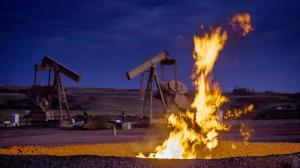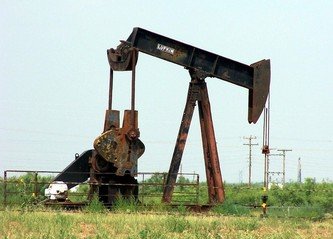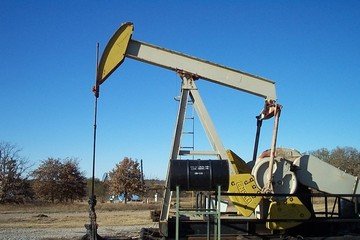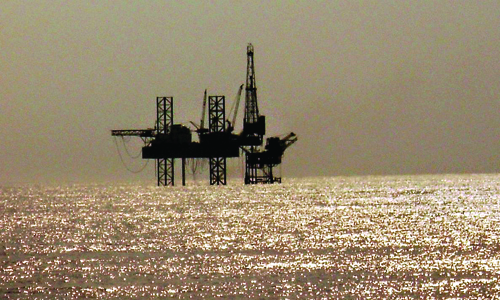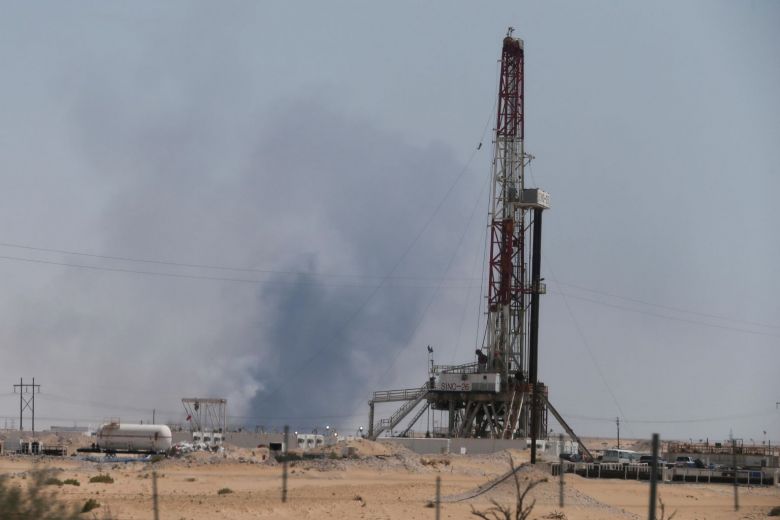
Smoke is seen following a fire at Aramco facility in the eastern city of Abqaiq, Saudi Arabia, on Sept 14, 2019.PHOTO: REUTERS
LONDON (REUTERS) – The strike on the heartland of Saudi Arabia’s oil industry, including damage to the world’s biggest petroleum-processing facility, has driven oil prices to their highest level in nearly four months.
Here are some facts about the impact on oil supply and spare capacity.
WHY IS IT SO DISRUPTIVE FOR GLOBAL OIL SUPPLIES?
The attack on Saudi oil facilities last Saturday (Sept 14) not only knocked out over half of the country’s production, but it also removed almost all the spare capacity available to compensate for any major disruption in oil supplies worldwide.
The attack cut 5.7 million barrels per day (bpd) of Saudi crude output, over 5 per cent of the world’s supply. But the attack also constrained Saudi Arabia’s ability to use the more than two million bpd of spare oil production capacity it held for emergencies.
The kingdom has for years been the only major oil producing country that has kept significant spare capacity that it could start up quickly to compensate for any deficiency in supply caused by war or natural disaster.
Most other countries cannot afford to drill expensive wells and install infrastructure, then maintain it idle.
Before the attack, the Organisation of the Petroleum Exporting Countries (Opec) global supply cushion was just over 3.21 million bpd, according to the International Energy Agency (IEA).
Saudi Arabia – the de facto leader of Opec – had 2.27 million bpd of that capacity. That leaves around 940,000 bpd of spare capacity, mostly held by Kuwait and the United Arab Emirates
Iraq and Angola also have some spare capacity. They may now bring that production online to help plug some of the gap left by Saudi Arabia – but it won’t be enough.
HAVEN’T OPEC AND ITS ALLIES BEEN CUTTING OUTPUT? CAN’T THEY JUST REVERSE THOSE CUTS?
Yes, Opec and its allies such as Russia have cut output to prevent prices from weakening because the market has been oversupplied.
Those cuts aimed to reduce supply by 1.2 million bpd. But much of that was from Saudi Arabia so it now cannot be reversed quickly.
Non-Opec members such as Russia are pumping near capacity, with perhaps only 100,000-150,000 bpd of available additional production.
WHAT ABOUT IRAN?
Iran holds spare capacity but it cannot get the oil to market because of sanctions imposed by the government of United States President Donald Trump.
Iran’s exports have fallen over two million bpd since April. Washington has said Iran was behind Saturday’s attack, so is unlikely to ease sanctions to allow Iran to plug a gap it believes was created by Teheran.
Iran, for its part, said after the attack that it would pump at full volume if sanctions were eased.
AND VENEZUELA?
US sanctions have also impacted the Venezuelan oil industry. But Venezuelan output has been in freefall for years and state oil company PDVSA is unlikely to be able to boost production much even if sanctions were eased.
WHAT ABOUT US SHALE? CAN SHALE PRODUCERS PUMP MORE?
The US has become the world’s top crude producer after years of rapid growth in supply from the shale sector, much of it pumped from fields in Texas. The US has also grown as an exporter, and shipped more crude to international markets in June than Saudi Arabia.
Shale producers can move quickly to pump more when prices rise, and can bring production online in a matter of months.
That is a much faster time line than most traditional oil production.
If the Saudi outage looks like it will be prolonged and oil prices rally significantly, then shale producers will raise output.
But even if shale producers pump more, there are constraints on how much the US can export because oil ports are already near capacity.
SO WHAT HAPPENS NOW? WHAT ABOUT OIL IN STORAGE?
It all depends on how long the outage lasts.
Saudi Arabia, the US and China all have hundreds of millions of barrels of oil in strategic storage. That is the storage that governments keep for exactly this scenario – to compensate for unexpected outages in supply.
They can release oil from strategic storage to meet demand and temper the impact on prices. Mr Trump said on Sunday that he had authorised a release from the US Strategic Petroleum Reserve.
The IEA, which coordinates energy policies of industrialised nations, advises all its members to keep the equivalent of 90 days of net oil imports in storage.
Oil from storage should keep the market supplied for some time, but oil markets will likely become increasingly volatile as storage is run down and the possibility of a supply crunch rises.
The IEA said last Saturday that the markets were still well supplied despite the Saudi disruptions.
“We are massively oversupplied,” said Mr Christyan Malek, head of oil and gas research for Europe, Middle East and Africa at JP Morgan, adding it would take five months of a five million bpd outage to take global crude supply levels back to a 40-year normal average.
“Having said that, this attack introduces a new, irreversible risk premium into the market,” he added.
WHAT HAPPENS IF THERE IS ANOTHER SUPPLY DISRUPTION?
With no spare capacity, future disruptions would cause oil prices to rise. A higher price over time will encourage producers to invest and pump more, while at the same time reducing consumption.
Opec member Libya is in the middle of a civil war, which threatens its ability to continue pumping oil. Another big Libyan disruption would add to the shocks and highlight the lack of spare capacity.
Nigerian exports have also suffered from disruptions.
Even before the Saudi attack, spare capacity was falling.
Consultancy Energy Aspects has said it expects Opec spare capacity to fall to below one million bpd in the fourth quarter from two million bpd in the second quarter of 2019

